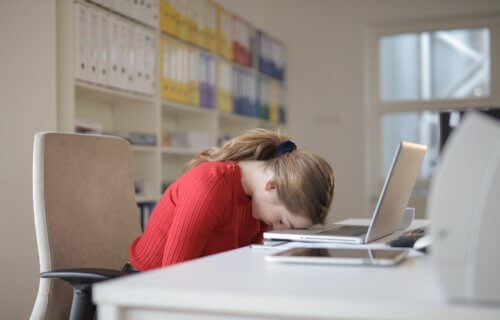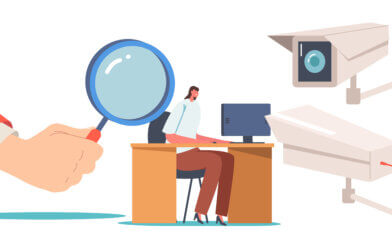TRONDHEIM, Norway — Burnout affects millions of people worldwide. The condition, marked by extreme mental and physical exhaustion linked to the workplace, builds up over time, but is there a way to prevent it? Researchers at the Norwegian University of Science and Technology (NTNU) are developing a tool to identify people who are at risk of burning out before they hit that proverbial wall.
Burnout is characterized by symptoms such as mental fatigue, a lack of enthusiasm for work, difficulty concentrating, and uncharacteristic overreactions in the workplace. The condition not only affects the individual’s health, leading to issues like cardiovascular disease, musculoskeletal pain, sleep disturbances, and depression, but it also impacts organizational productivity through increased absenteeism and loss of skilled workers.
The urgency to address burnout stems from its far-reaching implications on both personal and professional levels.
“Not addressing the risk of employee burnout in time can have long-term consequences,” says study author Leon De Beer, an associate professor of work and organizational psychology at NTNU’s Department of Psychology, in a university release.

To combat this, De Beer and his colleagues from the Healthy Workplaces research group have developed a novel tool aimed at identifying individuals at risk of burnout before it escalates. This tool, known as the Burnout Assessment Tool (BAT), has been tested in a study involving 500 Norwegian workers, offering promising results for its effectiveness in detecting early signs of the condition.
BAT focuses on four main groups of risk factors: exhaustion, mental distancing, cognitive impairment, and emotional impairment. Unlike previous methods, which lacked the detail necessary for both practical and research applications, BAT provides a comprehensive measure of burnout risk factors. Currently, there is no international standard for assessing burnout, making the development of BAT a significant step forward.
Burnout extends beyond just being a workplace syndrome. It also encompasses the challenges of maintaining a work-life balance. The effects of burnout do not cease when the workday ends. Instead, they can permeate other aspects of life, contributing to a cycle of stress and exhaustion that can last for years if not properly addressed.
Researchers underscore the necessity of not only treating individuals but also implementing organizational changes to ensure that work demands do not surpass the resources and support available to employees.
“We can deal with burnout through individual treatment, but it is of little use if people return to a workplace where the demands are too high and there are few resources. It is then highly likely that the employee will become ill again,” notes Marit Christensen, professor in NTNU’s Department of Psychology. “Therefore, it is important to create good working conditions and structures that safeguard the health of employees.”
💡Signs Of Burnout:
- Feeling mentally exhausted at work
- Struggling to feel enthusiastic about your job
- Having trouble concentrating when working
- Overreacting at work without meaning to

Norway’s performance in terms of work-related mental health is comparable to the European Union average, with a somewhat better balance between work and life, according to the study. However, the true international standing of Norway in relation to burnout prevalence will be clearer once results from other countries participating in BAT studies are compiled.
The BAT tool, which has proven effective regardless of gender and aims to be culturally independent, offers a preliminary online version for individuals to assess their risk of burnout. This self-assessment is designed for educational and entertainment purposes and is not a substitute for professional diagnosis or medical advice. Those concerned about work-related stress are encouraged to seek guidance from healthcare professionals.
The study is published in the Scandinavian Journal of Psychology.
You might also be interested in:
- Most Stressful Careers In 2023: Top 5 Anxiety-Inducing Jobs, According To Experts
- Burnout survey reveals 9 ways companies can save their workforce’s health
- American breaking point: 1 in 4 workers have quit their job over mental health
- Entrepreneurs are often feverish workaholics. So what’s their secret to avoiding burnout?




In the US, I would dare say getting burned out is mostly caused, because most working americans only get 2 weeks off a year 3 or 4 if they are lucky. Having just 2 weeks off a year isnt enough for most people. Especially as people age.
That’s how we do Capitalism here baby.
If you don’t like it go to Communist Russia where you belong.
Doubleplusgood!
Capitalism is for Patriot workers who will give their lives to make a buck or two.
We don’t stand for lazy welfare bums looking for a commie Union job or free government cheese.
“We don’t stand for lazy welfare bums” …I think we do. Look how much funding the welfare system gets in our good ole USA.
“Commie Union job or free government cheese”…. Roughly 28% of the approximately 132.5 million full time employees in the U.S. are represented by union jobs/contracts, federal employees, state employees, city employees, and county employees. Combine that with our socialization of healthcare that includes Medicare and Medicaid, I would argue that we do share characteristics with the other government and social structures that we loathe so much.
Are we worked to death? Worked to bad physical health? Worked to poor mental health? Unfortunately the only way to make a buck is to work. The majority of people cannot even get from Point A to Point B without funds. It certainly is a fine line. Health and prosperity vs physical/mental exhaustion and unhappiness. Are those in other countries with the commie jobs happier? They aren’t in the U.S., but maybe elsewhere. As we have found with research, the key to happiness is not in the green. Yet, the U.S. homeless are not happy either. There are however, places in this world where people have nothing and their happiness factor far exceeds the United States. They have found their happiness elsewhere.
Be that as it may, there is no other place I would rather live (even with my not set for life with pension and insurance) non-commie job.
If any American doesn’t like working conditions or even social welfare benefits or healthcare in the USA, he has the right and free will to move away from the USA. No moral judgment, it’s just not for everyone. Happiness comes from within. No amount of material goods or vacation can make someone happy, though they can help pass the time, happy or not.
People are considered machinery by the corporation.
The new generations refuse to work hard.
Socialism has made them lazy and worthless.
If you don’t make over a couple million per year in America, then you are an inferior welfare slob and are unworthy of living in the greatest country the Earth has ever seen. America.
I find it hilarious that a country with FIFTY-FIVE PERCENT TAXES is talking about burnout.
Usury by every sector of the “financial industry” is an even bigger menace, from the “Federal” Reserve down to the local community credit union.
And most of the taxes paid by citizens go to service the usury-based debt.
Why not study people who love their job, and have done the job for years? They’ve found something to emulate. I can’t tell you why, but I love my career of nearly 40 years. I have no intention to retire. Still, I don’t know why, and I see others around me younger, just trying to hang on until retirement. I don’t know how to advise them.
It’s somewhat amusing and sad that so many people believe that there are capitalistic economies in the world, or that democracies exist. Economies today are controlled by governments & bureaucrats. Most of the world embraced fascism in the 1920’s defined by you could only do what governments allowded with what you ‘owned.’ Communist governments own almost everything, and you live for the state. In WWII the US controlled ag & manufacturing production just as Germany did, and with more resources, and a better and greater manufacturing base out produced unto victory, arming most of the allies along the way. So, you don’t have to have a job or work to get burned out. You need only become aware that world govenments deem people slaves and expendable, and war is $$$ for some. Just count the wars & fights now going on; there’s a lot besides Ukraine, Israel, and other Near East. For those who ‘own’ property and think the US isn’t fascist, just stop paying taxes [extortion] and see how long you ‘own’ whatever. The taxes paid get you a whole lotta, not love, but bureaucrats. Politics is practicable application of philosophy. Philosophy is interpretive religion. Religion is the worship and service of God; or some other, or some system. Politics essentially defines who, what, and how people may worship.–Evan Dimitroff